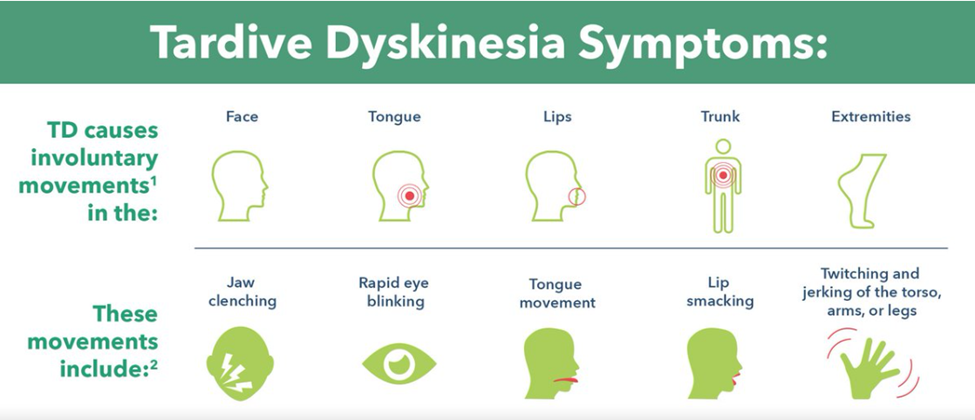A client is being seen in the mental health clinic. The client has been on a conventional, first-generation antipsychotic for 8 months and is now exhibiting tongue protrusion, lip smacking, and rapid eye blinking. A nurse would document this chronic syndrome as:
Akathisia
Neuroleptic malignant syndrome
Dystonia
Tardive dyskinesia
The Correct Answer is D
A. Akathisia: Akathisia is a side effect of antipsychotic medications characterized by restlessness, agitation, and a strong urge to move. It is not typically associated with tongue protrusion, lip smacking, or rapid eye blinking.
B. Neuroleptic malignant syndrome: Neuroleptic malignant syndrome is a rare but serious reaction to antipsychotic medications, characterized by fever, muscle rigidity, altered mental status, and autonomic dysfunction. It is not associated with the specific symptoms described in the scenario.
C. Dystonia: Dystonia is a movement disorder characterized by sustained or repetitive muscle contractions, leading to abnormal postures or repetitive movements. It can occur as a side effect of antipsychotic medications but typically presents differently from the symptoms described in the scenario.
D. Tardive dyskinesia: Tardive dyskinesia is a chronic syndrome characterized by involuntary, repetitive movements of the face, tongue, and other body parts. It is associated with long-term use of conventional, first-generation antipsychotic medications. Symptoms can include tongue protrusion, lip smacking, rapid eye blinking, and other abnormal movements.

Nursing Test Bank
Naxlex Comprehensive Predictor Exams
Related Questions
Correct Answer is C
Explanation
A. This response is inaccurate and potentially dismissive of the client's concerns. SSRIs generally take a few weeks to start showing noticeable effects, so stating that it will take months and advising the client to simply improve their attitude is not therapeutic or accurate.
B. This response relies on beliefs rather than evidence-based information about the medication's effectiveness. While a positive attitude can be beneficial, it's important to provide realistic expectations about the medication's timeline.
C. This response is the most accurate and therapeutic. It informs the client about the typical timeline for SSRIs to start working (two to three weeks for gradual improvement) and emphasizes the importance of continued medication adherence.
D. This response is highly inaccurate and could mislead the client. SSRIs do not start working within twenty minutes of the first dose; they require time to build up in the system and exert their therapeutic effects over a period of weeks.
Correct Answer is D
Explanation
A. Psychiatric disorders generally affect a client's ability to communicate verbally: This statement highlights the impact of psychiatric disorders on verbal communication, which may be impaired due to symptoms such as disorganized thinking, speech disturbances, or reduced speech output. However, it does not specifically address the importance of nonverbal communication awareness for nurses.
B. Clients are guarded with both verbal and nonverbal communication: This choice suggests that clients with mental illness may be guarded or reluctant to express themselves both verbally and nonverbally. While this can be true in some cases, it doesn't fully capture the primary reason why nurses are encouraged to be aware of nonverbal communication.
C. Psychiatric disorders are more likely to affect thoughts than physical behaviors: This statement focuses on the cognitive aspects of psychiatric disorders, emphasizing their impact on thoughts rather than physical behaviors. It does not directly address the importance of nonverbal communication in nursing care.
D. Nonverbal communication provides additional client information that is acted out unconsciously: This choice highlights a key reason why nurses are encouraged to be aware of nonverbal communication. Nonverbal cues, such as body language, facial expressions, and gestures, can convey important information about a client's emotional state, intentions, and needs, often unconsciously. This information is valuable for nurses in understanding and responding effectively to clients' needs and concerns.
Whether you are a student looking to ace your exams or a practicing nurse seeking to enhance your expertise , our nursing education contents will empower you with the confidence and competence to make a difference in the lives of patients and become a respected leader in the healthcare field.
Visit Naxlex, invest in your future and unlock endless possibilities with our unparalleled nursing education contents today
Report Wrong Answer on the Current Question
Do you disagree with the answer? If yes, what is your expected answer? Explain.
Kindly be descriptive with the issue you are facing.
